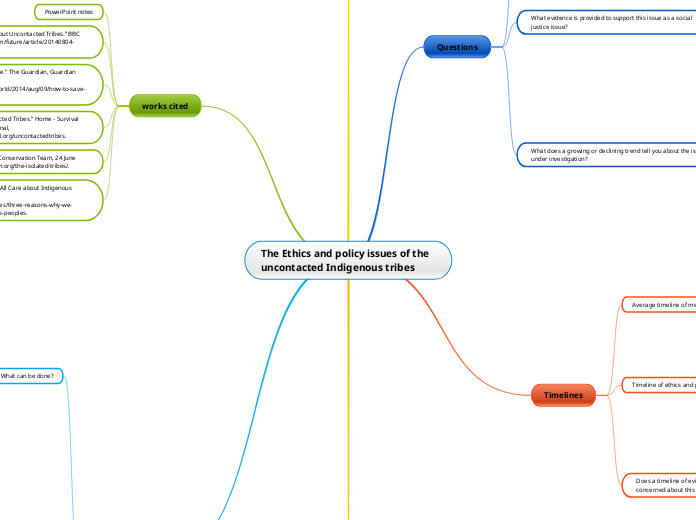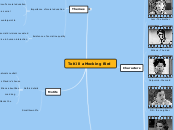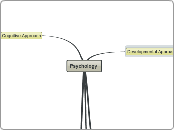The Ethics and policy issues of the uncontacted Indigenous tribes
The solution
Are there patterns that show if the organizations or individuals addressing this issue are doing so in a similar manner?
There are indeed patterns to show that most organizations fighting against this issue are doing so in a similar manner. Most organizations go about helping through spreading awareness of the issue and educating the public on why it matters. The next step these organizations do after getting the word out there is to either discourage any support to those who attempt to violate the policies set into place to protect the lands. Those such as logging companies who wish to strip the forest of its trees, or oil companies who wish to force these groups of their land in order to destroy it in an attempt to harvest the oil within the ground. Another action these organizations take to help is to set up campaigns. The campaign goals may differ. An example would be to campaign for turning the indigenous land into a national park, which would prevent the alteration of the land.
Who is helping
The Amazon conservation team
https://www.amazonteam.org/
https://pbs.twimg.com/profile_images/1490702216759545862/_Lk3_rfJ_400x400.jpg
News outlets and reporters
theguardian
https://upload.wikimedia.org/wikipedia/commons/thumb/7/75/The_Guardian_2018.svg/2560px-The_Guardian_2018.svg.png
BBC news
https://www.google.com/imgres?imgurl=https%3A%2F%2Fupload.wikimedia.org%2Fwikipedia%2Fen%2Fthumb%2Ff%2Fff%2FBBC_News.svg%2F1200px-BBC_News.svg.png&imgrefurl=https%3A%2F%2Fen.wikipedia.org%2Fwiki%2FFile%3ABBC_News.svg&tbnid=NFgYdOkp4vAm9M&vet=12ahUKEwiJz42JxPH2AhUEsHIEHSfFA2gQMygAegUIARDaAQ..i&docid=7XMbSaPlCh1ewM&w=1200&h=901&q=bbc%20news%20logo&ved=2ahUKEwiJz42JxPH2AhUEsHIEHSfFA2gQMygAegUIARDaAQ
National Geographic
https://logos-world.net/wp-content/uploads/2020/09/National-Geographic-Channel-Logo-2005-2016.png
Survival International
https://www.survivalinternational.org/
https://upload.wikimedia.org/wikipedia/en/8/8d/Survival_International.png
What can be done?
The creation of national parks to be made out of indigenous land, thus preventing anyone from disturbing the land
Support campaigns which strive to support the different groups by either preventing the invasion or legal claim to their lands, the harvesting of natural resources within close range to groups, or any attempt to make contact with these people.
Support groups like Survival International who strive to protect Indigenous groups across the globe by starting campaigns
Do not support any product or service which uses resources from the Rainforests or other location which houses uncontacted tribes
works cited
“Three Reasons Why We Should All Care about Indigenous Peoples.” World Bank Blogs, https://blogs.worldbank.org/voices/three-reasons-why-we-should-all-care-about-indigenous-peoples.
“The Isolated Tribes.” Amazon Conservation Team, 24 June 2019, https://www.amazonteam.org/the-isolated-tribes/.
International, Survival. “Uncontacted Tribes.” Home - Survival International, Survival International, https://www.survivalinternational.org/uncontactedtribes.
“How to Save an Amazonian Tribe.” The Guardian, Guardian News and Media, 9 Aug. 2014, https://www.theguardian.com/world/2014/aug/09/how-to-save-an-amazonian-tribe.
“Anthropology: The Sad Truth about Uncontacted Tribes.” BBC Future, BBC, https://www.bbc.com/future/article/20140804-sad-truth-of-uncontacted-tribes.
PowerPoint notes
s
invaders disturbing ecosystems which these groups rely on for survival
https://encrypted-tbn0.gstatic.com/images?q=tbn:ANd9GcQgoBbV_v-vHjP58LzjDqarUUJ9vwUUcRmrvQ&usqp=CAU
loggers and other companies stealing the natural resources
https://ichef.bbci.co.uk/news/976/cpsprodpb/17310/production/_123229949_tv070100970.jpg
https://ichef.bbci.co.uk/news/976/cpsprodpb/9146/production/_118409173_gettyimages-1163385255-594x594.jpg
potential for missionaries or other groups to try and brainwash them into other religons
Land could be stolen without any negotiations
Introduction of diseases
assimilation
Murder
Forced relocation
Why someone should care?
These indigenous groups help to protect our environment
Whilst only occupying a small amount of the earths surface, indigenous groups safeguard 80% of the worlds untouched biodiversity. Majority of the earths oxygen is emitted from the amazon which is the primary area that these uncontacted groups reside and protect.
These people are easy targets who cannot defend themselves
A lack of legal representation makes it so that these groups are unable to legally claim the land they live upon or even defend legal attempts to claim it.
A lack of technology makes it so that these groups are greatly outmatched when it comes to a physical battle for their land
Indigenous peoples are often extremely poor
despite making up 5% of the population, they account for 15% of the Impoverished. When policies and ethics are disregarded, these uncontacted groups are forced into the greater civilization of the world. But with no information on how the world runs, these people often find themselves deep in progress.
Timelines
Does a timeline of evidence show that people are more concerned about this issue or less concerned about this issue?
These timelines show that, despite there being much more occurrences where policies and ethical issues are taking place, there are many other times where there are people who take the initiative to fight against the people trying to assimilate these uncontacted groups. This is seen through the numerous groups being created over the past few years by governments in order to prevent the integration or interference with these isolated groups. Compare this with the past 200 years of Governments taking the land for themselves without any say and it becomes clear that this issue has much more concern that one had before.
Timeline of ethics and policy issues
1. Policies and treaties are set into place in order to protect uncontacted indigenous groups and their land from outside interference
2. Natural resources or large amounts of land attract the eyes of large corporations
3. Backroom deals are made between government and corporation which allows for said corporation to have access to the land in order to harvest natural resources or legal ownership of the land
3. The groups and their land are left alone and mostly protected by specialized government protection initiatives or non-government groups
Average timeline of meeting a new tribe
1. A new uncontacted tribe is discovered
2. The tribe is left alone
2. Contact is made with the tribe
3. The tribe is not friendly and issues occur (most likely attempted murder)
3. The tribe is friendly, which allows for trade and the potential of integration into a larger society
4. New diseases are introduced to their weak immune systems, the land once theirs is taken from them (most likely turned to farming land, in most cases, the surviving members are left in poverty
Questions
What does a growing or declining trend tell you about the issue under investigation?
In the case of the ethics and policy issues relating to the uncontacted tribes, there is quite a growing trend relating to it. This is due to the larger coverage of the issue and the large surge of human activists over the past few years.
A declining trend would mean that no one is looking into the issue.
A growing trend would tell you that the issue is highly observed and being looked into by a variety of interested people. This could be by people who are interested in helping to conserve the policies put into place to protect these groups of people, but could also be looked into by those wishing to gain information on how to bypass certain policies in order to gain the land and its resources for their own means.
What evidence is provided to support this issue as a social justice issue?
The ethics, policy issues, and mistreatment of these uncontacted tribes is irrefutably a social justice issue. In making contact with these tribes, something that they didn't request or even fathom could be a possibility, they have the great potential of being met with unintended but very real issues like introduction to new diseases. The seizing of their land for commercial or agricultural use is a social justice issue bright as day, seeing as how those who live on the land have no say in the treatment and use of their land, and will most likely be required or forced to relocate their homes.
What exactly is a uncontacted Indigenous tribe?
http://cache.boston.com/universal/site_graphics/blogs/bigpicture/amazon_05_30/amazon2.jpg
Communities of indigenous peoples who live without any contact or knowledge of neighboring communities of larger societies.









